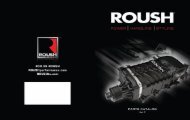2005 Towing Guide - Ford Fleet - Ford Motor Company
2005 Towing Guide - Ford Fleet - Ford Motor Company
2005 Towing Guide - Ford Fleet - Ford Motor Company
You also want an ePaper? Increase the reach of your titles
YUMPU automatically turns print PDFs into web optimized ePapers that Google loves.
Gross Combination Weight<br />
(GCW) is the weight of the loaded<br />
vehicle (GVW) plus the weight of<br />
the fully loaded trailer. It is the<br />
actual weight obtained when the<br />
vehicle and trailer are weighed<br />
together on a scale.<br />
Gross Combination Weight<br />
Rating (GCWR) is the maximum<br />
allowable weight of the towing<br />
vehicle and the loaded trailer –<br />
including all cargo and passengers –<br />
that the vehicle can handle without<br />
risking damage. (Important: The<br />
towing vehicle’s brake system is rated<br />
for operation at the GVWR – NOT<br />
GCWR. Separate functional brake<br />
systems should be used for safe<br />
control of towed vehicles and for<br />
trailers weighing more than 1,500<br />
lbs. when loaded.) The measured<br />
GCW must never exceed the GCWR.<br />
Maximum Loaded Trailer Weight<br />
(as shown in the Trailer <strong>Towing</strong><br />
Selector charts pages 16-21) is the<br />
highest possible weight of a fully<br />
loaded trailer the vehicle can tow,<br />
based on a minimum towing vehicle<br />
GVW. It assumes a towing vehicle with<br />
any mandatory options, no cargo,<br />
tongue load of 10-15% (conventional<br />
trailer) or king pin weight of 15-25%<br />
(fifth-wheel trailer), and driver only<br />
(150 lbs.). F-Series Super Duty chassis<br />
cab models also assume a second-unit<br />
body weight of 1,000 lbs. Weight of<br />
additional options, passengers, cargo<br />
and hitch must be deducted from this<br />
weight.<br />
Tongue Load or Fifth-Wheel King<br />
Pin Weight is another critical<br />
measurement that must be made before<br />
towing. It refers to the amount of the<br />
trailer’s weight that presses down on the<br />
trailer hitch. Too much tongue load or<br />
king pin weight can cause suspension/<br />
drivetrain damage, and can press the<br />
vehicle down in back causing the front<br />
wheels to lift to the point where traction,<br />
steering response and braking can be<br />
severely decreased. Too little tongue load<br />
or king pin weight can reduce rear-wheel<br />
traction and cause instability, which may<br />
result in tail wagging or jackknifing.<br />
Tongue load or king pin weights must<br />
meet the following requirements*:<br />
– For trailers up to 2,000 lbs., tongue<br />
load not to exceed 200 lbs.<br />
– For conventional trailers over 2,000<br />
lbs., tongue load 10 -15% of loaded<br />
trailer weight.<br />
– For fifth-wheel trailers, king pin<br />
weight 15-25% of loaded trailer<br />
weight.<br />
Examples: For a 5,000-lb. conventional<br />
trailer, multiply 5,000 by .10 and .15 to<br />
obtain a proper tongue load range of<br />
500 to 750 lbs. For an 11,500-lb. fifthwheel<br />
trailer, multiplying 11,500 by .15<br />
and .25 yields a king pin weight range<br />
of 1,725 to 2,875 lbs.<br />
Note: Be sure the addition of tongue<br />
load or king pin weight does not cause<br />
the key towing vehicle weight limits<br />
(GVWR and Rear GAWR) to be<br />
exceeded. Remember, GVWR and<br />
GAWR are found on the vehicle’s Safety<br />
Compliance Certification Label. If either<br />
of these limits is exceeded, you should<br />
go with a larger vehicle or a smaller<br />
trailer.<br />
Sample Truck Safety Compliance Certification Label<br />
(Refer to actual label on your vehicle)<br />
Front GAWR GVWR<br />
Rear GAWR<br />
MEASURING TONGUE LOAD WITH COMMERCIAL SCALE<br />
To measure actual tongue load or king pin weight, disconnect<br />
the trailer and place only the tongue (king pin) on a scale (at<br />
hitch ball or fifth-wheel king pin receiver height). If the tongue<br />
load/king pin weight exceeds the upper weight limit, move more<br />
of the trailer contents rearward to achieve the recommended<br />
tongue load/king pin weight. If the tongue load or king pin<br />
weight is less than the lower limit, shift the load forward.<br />
*Refer to the chart on page 25 for tongue load recommendations with<br />
<strong>Ford</strong> factory-installed rear step bumpers and trailer hitch receivers.<br />
27




